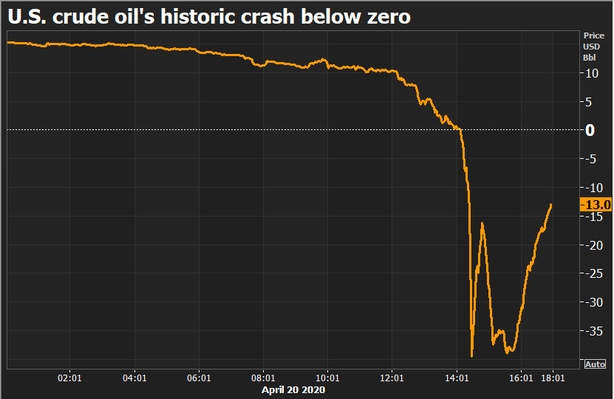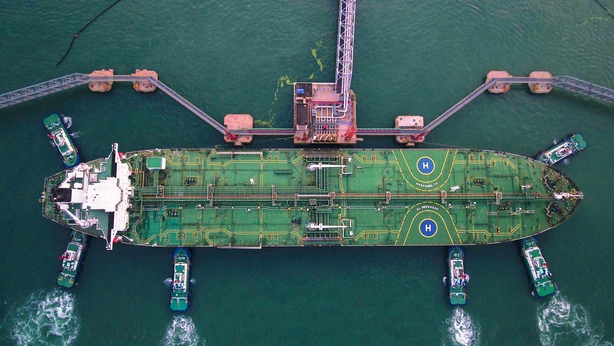Brent crude futures plunged 25% to the lowest in nearly two decades, a day after panicked traders sent US oil below minus $40 per barrel on fears of a historic glut due to the destruction of fuel demand by the coronavirus pandemic.
Monday's historic crash in US crude futures saw the front-month May contract, which expires Tuesday, settling at negative $37.63 a barrel as traders facing a dearth of storage space and customers scrambled to avoid taking delivery of barrels.
While that trade was anomalous, the steep decline in Brent and US futures expiring in June showed the market remained worried that the overwhelming supply and weak demand will persist for weeks.
Brent futures for June delivery fell $6.52, or 25.5%, to $19.05 a barrel, while US West Texas Intermediate crude for June fell $9.09, or 44.5%, to $9.09.
The slump in the US contract was exaggerated by the looming expiry later this evening of the front-month contract for May.
We need your consent to load this rte-player contentWe use rte-player to manage extra content that can set cookies on your device and collect data about your activity. Please review their details and accept them to load the content.Manage Preferences
With the market oversupplied and storage facilities already brimming, holders of the contract for May delivery were in the unprecedented position of having to pay those taking the crude.
The main US storage hub in Cushing, Oklahoma, the delivery point for WTI is expected to be full within weeks.
OPEC and its allies, including Russia, have announced sweeping cuts in production, amounting to almost 10% of global supplies.
But with economies virtually at a standstill due to coronavirus lockdowns, demand has dropped as much as 30%.
"The recently agreed supply cuts do little to solve the near-term oversupply problem in the global market," JBC Energy said in a note.

Kremlin spokesman Dmitry Peskov said today that leading global oil producers could hold talks again to discuss their output deal further if needed.
US President Donald Trump has described the drop in the US front-month crude price as a short-term issue caused by a "financial squeeze".
He said his administration would consider halting imports of oil from Saudi Arabia, the world's biggest exporter who spearheaded OPEC efforts to curb output.
We need your consent to load this rte-player contentWe use rte-player to manage extra content that can set cookies on your device and collect data about your activity. Please review their details and accept them to load the content.Manage Preferences
Read more
Why oil prices turned negative for the first time
Fuel prices are falling while everyone's at home
Analysts said that negative prices are a temporary glitch reflecting stressed flows in the futures markets and stressed storage conditions somewhere in the US Midwest.
US crude inventories were expected to rise by about 16.1 million barrels in the week to April 17 after posting the biggest one-week build in history, five analysts polled by Reuters found.

Chris Weafer, an Irish economist based in Moscow and chief executive of Macro-Advisory, has described as "extraordinary" the decision by oil producers to pay buyers take surplus oil.
However he said the move is a technical issue and does not imply that we are about to get free petrol.
Chris Weafer explained that it relates to a specific contract that traders bought several months ago.
The contract expires today which means that if traders were left holding the contract, they would have to pay for it.
However Mr Weafer told Morning Ireland that there is a serious problem in the oil market and the price of oil is likely to remain low, and go lower, over the next several weeks and months.
This is because the demand for oil has collapsed while there is also a supply glut.
He told Morning Ireland that US oil output has almost doubled in the last ten years which means there is a huge increase in supply at a time that volume has collapsed.
He cautioned that there is always a lag between the price of oil in the market and what happens at the petrol pump, but said we should be seeing cheaper petrol at the pumps now.
The economist added that by early Summer there should be considerably cheaper petrol and there will probably be cheaper oil and petrol prices for at least the rest of this year.

